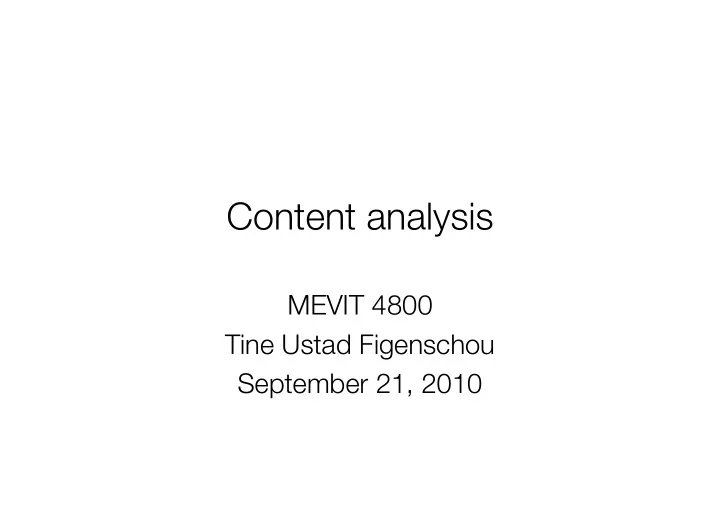

Content analysis MEVIT 4800 Tine Ustad Figenschou September 21, 2010
Content analysis Today’s lecture: 1) Variables and predictions 2) Measurement techniques (validity) 3) Reliability
Content Analysis: Definitions Sim imple le defi finit itio ion: the systematic, objective, quantitative analysis of message characteristics. (Neuendorf 2002:1)
Content Analysis: Definitions Exten xtended ed d defin efinitio ition: content analysis is a summarizing, quantitative analysis of messages that relies on the scientific method (including attention to objectivity- intersubjectivity, a priori design, reliability, validity, generalizability, replicability, and hypothesis testing) and its not limited as to the types of variables that may be measured or the context in which these messages are created or presented ( Neuendorf 2002:10)
Content Analysis: Variables and predications • Variable (def.): definable and measurable concept that holds different values for different individual cases or units . • Critical variable (def.): those features that are vital to a comprehensive understanding of the messages that will be studied (the message pool), in the specific medium used.
Content Analysis: Variables and predications Selecting variables: 1) Universal variables 2) Using theory and past research for variable collection 3) A grounded or ‘emergent’ process for variable identification 4) Attempting to find medium-specific critical variables
Content Analysis: Variables and predications • Hypothesis (def.): a statement of an expectation about empirical reality, based on a clear theoretic rationale or on prior evidence. • Directional or non-directional • Research question (def.): a query about empirical reality, typically driven by theory or prior nonscientific observation. • Conceptual definition of the variable
Content Analysis: Variables and predications Example: Al Jazeera English’s editorial line and editorial agenda Anniversary promo Al Jazeera English
Content Analysis: Variables and predications RQ 1: Does Al Jazeera English cover the South more profoundly – more frequently, in more in-depth formats and with a larger presence on the ground – than the North?
Content Analysis: Variables and predications RQ 2: Does Al Jazeera English interview grass-root sources and independent elite sources more extensively - more frequently and in more in-depth formats – than sources representing the establishment?
Content Analysis: Variables and predications H1: Al Jazeera English covers the South more profoundly – more frequently, in more in-depth formats and with a larger presence on the ground – than the North.
Content Analysis: Measurement techniques • General and valuable methodological insights • Measurement (def.): the assignment of numerals to objects or events according to rules. • Discuss four key standards for good measurement
Content Analysis: Measurement techniques 1) 1) Valid alidity: ity: the extent to which a measuring procedure represents the intended, and only the intended, concept. 2) 2) Accu ccuracy: racy: the extent to which a measuring procedure is free of bias (nonrandom error). 3) 3) Precisio recision: the fineness of distinction made between categories or levels of a measure 4) 4) Reliab eliability: ility: the extent to which a measuring procedure yields the same results on repeated trials
Content Analysis: Measurement techniques To assess external validity : • The representativeness of the sample • True to life • Full report of all content analysis procedures
Content Analysis: Measurement techniques • Sampling (def.) the process of selecting a subset of units from the larger population. • Population (def.): the set of units being studied, the set of units to which the researcher wishes to generalize. • Probability sampling: all units must have an equal chance of being selected.
Content Analysis: Measurement techniques To assess internal validity : • Operationalization (Neuendorf def.): the process of developing measures, the construction of actual, concrete measurement techniques.
Content Analysis: Measurement techniques To assess internal validity : • Categories should be exhaustive • Categories should be mutually exclusive • Each variable should be measured with categories that are the highest level of measurement possible
Content Analysis: Reliability • Reliability (def.): the extent to which a measuring procedure yields the same results on repeated trials. • Intercoder reliability • Without reliability a measure cannot be considered valid.
Content Analysis: Reliability • Measured through agreement or covariation • Threats to reliability: • A poorly executed coding scheme • Inadequate coder training • Coder fatigue • ... or presence of a rogue coder
Recommend
More recommend